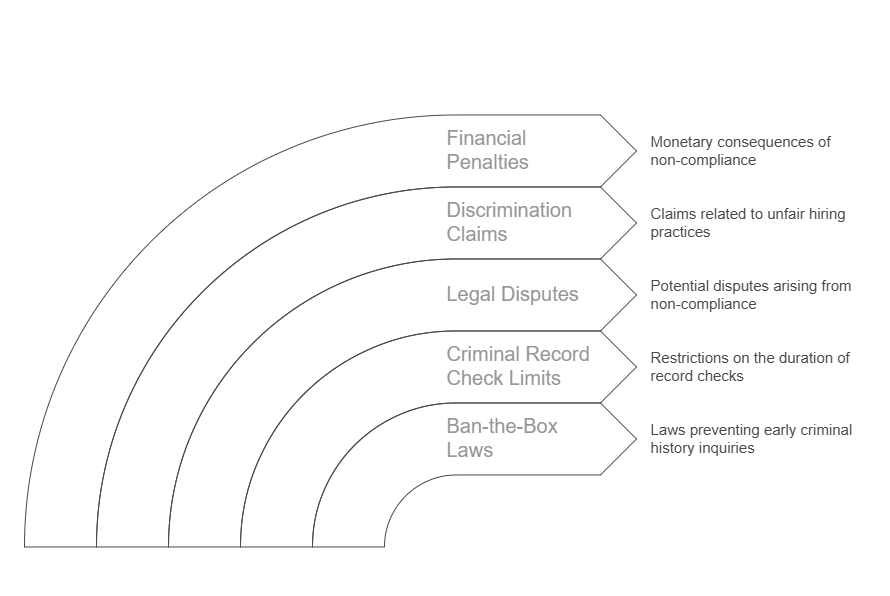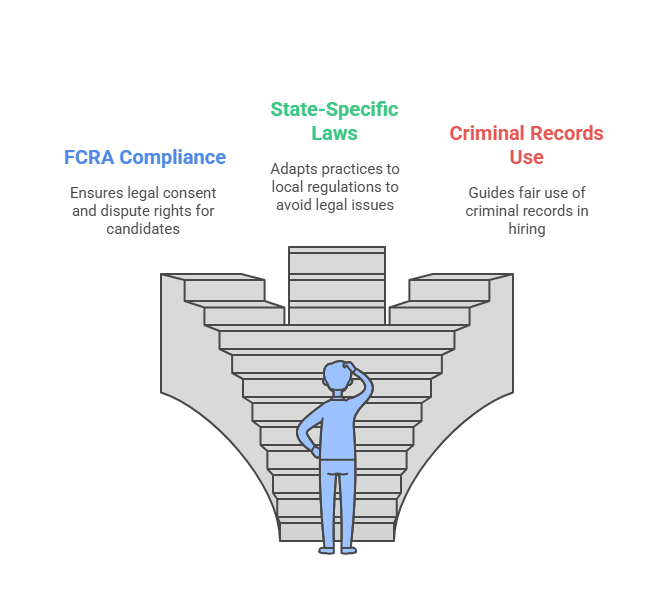
Understanding Background Checks and New Laws in 2025
Background checks are a crucial element of the hiring process, enabling employers to verify the information provided by candidates and ensure they are making informed, responsible hiring decisions. These checks offer employers insight into a candidate’s past behavior and qualifications, helping to reduce risks related to fraud, negligence, and non-compliance. For instance, confirming employment history, criminal records, and education credentials can prevent hiring individuals with dishonest or misleading backgrounds.
As we move into 2025, understanding the nuances of background check regulations has become even more critical for employers. The legal landscape around background checks is continually evolving, and failing to comply with new or revised laws can expose businesses to legal risks, fines, and reputational damage.
Different Types of Background Checks and Their Importance
Employers typically rely on a range of background checks to make the best hiring decisions. Here’s a breakdown of the most common types:
- Criminal Record Checks: One of the most commonly used background checks, these help employers identify any past criminal behavior. Depending on the job, criminal history may be relevant for safety-sensitive positions or roles requiring trustworthiness. Criminal checks vary by state, and employers must understand the limitations imposed by local laws.
- Employment Verification: This check confirms a candidate’s job history, ensuring they have held positions as claimed. It helps employers verify that candidates possess the work experience necessary for the role.
- Credit Reports: For jobs that involve financial responsibilities, employers may request a candidate’s credit report. This helps assess financial responsibility, although employers must adhere to strict guidelines on when and how these reports can be used.
- Education Verification: Employers check academic credentials to verify that the candidate’s educational qualifications are accurate. This is particularly important for positions where specific degrees or certifications are required.
- Social Media Screening: Some employers also conduct social media screenings to better understand a candidate’s character and behavior. This can offer additional context, but employers must be cautious not to violate privacy regulations.
Background checks are more than just verifying information; they are a safeguard for both the employer and the employees. By conducting thorough checks, companies protect themselves from liability and ensure that new hires align with their values and job requirements.
Why Understanding New Laws in 2025 is Critical for Employers

With 2025 fast approaching, employers need to be well-versed in the updated legal requirements surrounding background checks. Laws are constantly changing, and employers must ensure their processes comply with state-specific and federal regulations. For instance, some states have implemented “Ban-the-Box” laws that restrict employers from asking about criminal history during the early stages of the hiring process. Others may place limits on how far back an employer can look into a candidate’s criminal record.
Failure to comply with these laws can lead to legal disputes, claims of discrimination, and even financial penalties. To navigate these changes, employers must regularly review their policies and stay informed about local laws.
The 14 New Background Check Laws Employers Must Be Aware Of in 2025
Here are some key new laws that employers need to understand in 2025:
- Ban-the-Box Laws (California, New York, Illinois): Employers can no longer ask candidates about their criminal history until after a conditional job offer has been made.
- Criminal Record Restrictions (Texas, Florida): States like Texas and Florida have introduced limitations on how far back criminal records can be used in hiring decisions.
- Social Media Screening Restrictions (California): New restrictions prevent employers from using a candidate’s social media profile as a basis for hiring decisions without proper consent.
- Salary History Bans (Colorado, Massachusetts): Employers cannot ask candidates about their past salaries to avoid perpetuating wage inequality.
- Arrest Record Limitations (Oregon, Hawaii): States like Oregon have prohibited employers from using arrest records unless the arrest resulted in a conviction.
- Fair Credit Reporting Act (FCRA) Amendments (Nationwide): The FCRA has been updated to enhance transparency in the credit check process, giving candidates the right to dispute any errors.
- Disability Discrimination (California): Employers must be cautious about using background checks to discriminate against candidates with disabilities.
- Pre-Employment Drug Screening Limits (Nevada, Utah): Certain states have put restrictions on pre-employment drug testing, especially for non-safety-sensitive roles.
- Ban-the-Box Expansion (Michigan, Wisconsin): These states have expanded Ban-the-Box laws to cover private employers.
- Mandatory Background Checks for Gig Workers (New York): New York has mandated background checks for gig economy workers, including drivers and delivery personnel.
- Youth Employment Protections (Washington, Oregon): Certain states have implemented new laws protecting youth from invasive background checks when seeking employment.
- Right to Explanation for Background Checks (Illinois): Illinois requires employers to provide candidates with a clear explanation of the background check process and any adverse actions taken as a result.
- Data Privacy and Security (California, Nevada): Data protection laws require employers to secure candidates’ personal information gathered during background checks.
- Use of Arrest Records for Government Employees (Virginia): Some states limit how arrest records are used, especially in government hiring processes, to prevent discrimination based on arrests that did not result in convictions.
Key Points of New Regulations
| Law | State/Region | Key Point |
|---|---|---|
| Ban-the-Box | California, New York | Delay criminal history inquiries until later stages of hiring. |
| Criminal Record Restrictions | Texas, Florida | Limit how far back employers can check criminal records. |
| Social Media Screening Restrictions | California | Employers cannot screen candidates’ social media without consent. |
| Pre-Employment Drug Screening Limits | Nevada, Utah | Restrict drug testing for non-safety-sensitive roles. |
| Fair Credit Reporting Act Amendments | Nationwide | Enhance transparency in the use of credit reports. |
How RapidHireSolutions Helps Employers Stay Compliant
RapidHireSolutions provides employers with a streamlined and compliant approach to background checks. By continuously updating its services in line with changing state and federal laws, RapidHireSolutions ensures that businesses remain compliant with the latest regulations. Employers can rely on RapidHireSolutions to navigate the complexities of new laws and stay ahead of potential legal risks.
With RapidHireSolutions, employers receive timely and accurate background check results while avoiding compliance pitfalls. This allows companies to make informed hiring decisions while adhering to the law.
RapidHireSolutions vs. Competitors
Pros & Cons Comparison Table
To help you make an informed decision about which background check provider to use in 2025, here’s a side-by-side comparison of RapidHireSolutions and a generic competitor. This table evaluates the key factors employers should consider when choosing a background screening provider, such as accuracy, compliance with 2025 laws, turnaround time, customer support, and cost-effectiveness.
| Factor | RapidHireSolutions ✅ | Generic Competitor ❌ |
|---|---|---|
| Accuracy of Checks | ✅ High accuracy | ❌ Moderate accuracy |
| Compliance with 2025 Laws | ✅ Full compliance | ❌ Limited compliance |
| Turnaround Time | ✅ 24-hour results | ❌ 15-20 days |
| Customer Support | ✅ 24/7 support | ❌ Limited availability |
| Cost-Effectiveness | ✅ Competitive pricing | ❌ Higher costs |
Why RapidHireSolutions is Ideal for Employers
RapidHireSolutions offers distinct advantages over its competitors. First and foremost, the company’s commitment to full compliance with 2025 laws sets it apart. As discussed earlier, the legal landscape for background checks is changing rapidly, with new regulations governing the use of criminal records, social media screening, and data privacy. RapidHireSolutions stays ahead of the curve, ensuring that employers don’t face legal risks or costly fines due to non-compliance.
Additionally, turnaround time is a critical factor for employers who need to make swift hiring decisions. RapidHireSolutions guarantees 24-hour results, allowing businesses to expedite their hiring process without compromising accuracy. Competitors may take up to 15-20 days to provide results, which can slow down recruitment efforts and lead to missed opportunities.
Another advantage of RapidHireSolutions is its customer support. Employers can access 24/7 assistance, ensuring that any questions or concerns are addressed promptly. In contrast, many competitors offer limited customer support, which can lead to delays and frustration for businesses.
Finally, RapidHireSolutions offers cost-effective pricing, allowing employers to stay within budget while benefiting from accurate, compliant, and timely background checks. Many competitors, on the other hand, may charge higher rates for similar services.
Comparison of Turnaround Times
Below is a comparison of turnaround times for background checks between RapidHireSolutions and a typical competitor. As employers seek efficient hiring solutions, it’s essential to understand how speed impacts the recruitment process.
| Provider | Turnaround Time |
|---|---|
| RapidHireSolutions | ✅ 24 hours |
| Generic Competitor | ❌ 15-20 days |
Let’s Dive Into a Detailed Analysis of Why RapidHireSolutions Outperforms Its Competitors in Complying with the New 2025 Laws
In 2025, staying compliant with rapidly changing background check laws is critical. Here’s a more detailed look at the pros of RapidHireSolutions and the cons of its competitors:
4 Pros of RapidHireSolutions
- Quick Turnaround: RapidHireSolutions offers 24-hour results, enabling employers to hire quickly, reducing downtime and ensuring that positions are filled promptly. This is especially important in competitive industries where time is of the essence.
- Full Compliance with 2025 Regulations: RapidHireSolutions ensures full compliance with the new background check laws, including the use of arrest records, the implementation of Ban-the-Box laws, and new social media screening restrictions. This gives employers confidence that their hiring practices are legal and up to date.
- High Accuracy: Employers can trust the results from RapidHireSolutions because the company uses robust verification systems, ensuring that the data provided in background checks is accurate and comprehensive. This helps businesses make informed, risk-free hiring decisions.
- Excellent Customer Support: RapidHireSolutions offers around-the-clock customer support to address any issues employers may face during the background check process. Whether it’s a question about compliance or assistance with understanding a report, RapidHireSolutions is there to help.
4 Cons of Competitors
- Longer Processing Times: Competitors may take 15-20 days to complete a background check, which slows down the hiring process and risks losing top talent to faster-moving competitors.
- Limited Compliance with 2025 Regulations: Many background check providers are slow to adapt to new laws, especially those introduced in 2025. This means that competitors may not be fully compliant with state-specific laws, putting employers at risk of legal issues.
- Lower Accuracy: Competitors may not provide as comprehensive or accurate reports, leading to potential errors that can result in costly hiring mistakes.
- Higher Costs: Many competitors charge higher rates for background check services without offering the same level of service and accuracy as RapidHireSolutions. This can strain employer budgets, especially for companies conducting frequent background checks.
Why RapidHireSolutions is the Best Option for Businesses in 2025
In summary, RapidHireSolutions stands out as the best choice for businesses in need of fast, reliable, and compliant background checks in 2025. By providing accurate results, ensuring compliance with the latest laws, offering quick turnaround times, and delivering exceptional customer service, RapidHireSolutions helps businesses make the best hiring decisions while staying compliant with new regulations.
For employers navigating the complexities of new background check laws in 2025, RapidHireSolutions is a trusted partner that ensures both legal compliance and hiring efficiency.
Legal Considerations for Employers in 2025
As the landscape of background checks continues to evolve, employers must stay vigilant to ensure they are fully compliant with legal requirements. In 2025, several key legal considerations will affect how employers use background checks to assess potential hires:

- FCRA Compliance
The Fair Credit Reporting Act (FCRA) remains one of the most significant regulations governing background checks. It mandates that employers obtain written consent from candidates before conducting a background check. Employers must also disclose any potential adverse actions (such as denying employment based on background check results) and allow candidates to dispute any incorrect information. Failing to adhere to these rules can result in lawsuits and substantial fines. - State-Specific Laws
Background check laws vary widely from state to state. For example, some states, such as California, limit the use of arrest records, while others may have Ban-the-Box laws that prevent employers from asking about criminal history on initial job applications. Employers must keep track of the unique regulations in each state where they hire to ensure they are not violating local laws. - Use of Criminal Records
In recent years, several states have passed laws that restrict the use of certain criminal records during the hiring process. For example, many states now have provisions that prevent employers from considering arrest records that did not result in convictions. Understanding how these laws apply is critical to maintaining compliance. - Social Media and Online Presence
In 2025, there are more regulations governing the use of social media and online profiles as part of background checks. Employers should be careful when considering a candidate’s online presence, as certain types of social media screenings may now require additional disclosures or consent. Employers must avoid using online data in a way that could be discriminatory or illegal. - Ban-the-Box Laws
As of 2025, Ban-the-Box laws are gaining traction in many states. These laws prohibit employers from asking candidates about their criminal history until later in the hiring process, such as after an initial interview. Employers must adapt their application processes to comply with these laws and avoid potentially discriminatory practices. - Discrimination and Fair Hiring Practices
Employers must be cautious to avoid using background checks in a way that disproportionately affects candidates based on their race, ethnicity, gender, or other protected characteristics. Discriminatory practices in hiring are illegal and can lead to significant legal consequences. Employers should ensure their background check policies are consistent and non-discriminatory.
Frequently Asked Questions (FAQs)
Here are five frequently asked questions that address common concerns related to background checks in 2025:
Remote workers are not exempt from background check laws. Employers hiring remote employees must still comply with applicable state and federal regulations, even if the worker is located in a different state. It is crucial to understand the local laws that govern background checks in the worker’s state. Yes, under the FCRA, employers must obtain written consent from candidates before conducting a background check. Additionally, they must notify candidates if an adverse decision is made based on the results of the background check. Several states now limit the use of arrest records in hiring decisions. Employers can typically only use arrest records if they have led to a conviction. Be sure to check the specific laws in your state to understand the nuances of these restrictions. If an employer discovers discrepancies in a background check, they should allow the candidate to dispute the findings. Candidates must be informed of the issue and given an opportunity to provide clarification or correct the information. Many new laws took effect in 2025, with certain state laws already in place and others slated to be enforced over time. Employers must stay up-to-date with local and federal regulatory changes to avoid non-compliance. Consulting with a background check provider like RapidHireSolutions can ensure compliance with these evolving regulations.
How do new laws affect background checks for remote workers?
Are employers required to inform candidates about background checks?
How do new laws impact the use of arrest records?
What should employers do if they find discrepancies in a background check?
What is the timeline for implementing the new background check laws?
Conclusion
The background check process is a crucial step in building a reliable and effective workforce. As we move into 2025, the legal landscape surrounding background checks is shifting, and employers must be prepared to comply with new regulations. From the Fair Credit Reporting Act (FCRA) to Ban-the-Box laws and restrictions on using criminal records, understanding and adhering to these changes is essential for minimizing legal risks.
Choosing a trusted background screening provider, such as RapidHireSolutions, ensures that your organization stays compliant with the latest regulations. RapidHireSolutions not only helps you navigate the complexities of background checks but also provides fast, reliable, and cost-effective services. With their expertise in handling compliance and providing accurate background check results, employers can confidently make hiring decisions while minimizing legal risks.
By staying informed and working with a partner that understands the nuances of background check regulations, you can build a strong, trustworthy workforce while avoiding costly mistakes. As background check laws continue to evolve, RapidHireSolutions remains a valuable resource for employers seeking peace of mind and legal compliance in 2025 and beyond.
